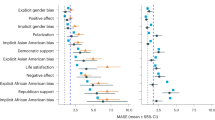Abstract
This is an essay and report on the social forecasting industry-the collection of individuals and organizations, both profit and nonprofit, supplying forecasts of social futures in direct exchage for pay. It begins with a review of the industry's size, growth, and scope; contrary to initial impressions, the industry is by any comparative standard quite small, occupying a precarious niche in the much larger market for statistical services. Hallmark methodologies of the industry, including the Delphi method and cross-impact analysis, are discussed extensively. These methodologies are linked to a domain assumption of the industry—namely, that the complexities of the social world are best rendered tractable by forming consensuses of experts' judgments. It is argued that the key characteristic differentiating the social forecasting industry from forecasting in the social sciences proper—the existence of a direct, paying market for services—is an important element in maintaining the most salient methodological and product differences between the two arenas: The marketplace for forecasts is not the same as the marketplace for ideas.
Similar content being viewed by others
References
Alter, S.: 1979, ‘The evaluation of generic cross-impact models’, Futures: The Journal of Forecasting and Planning, 11, 132–150.
Amara, R.: 1975, Some Methods of Futures Research, Institute for the Future (Working Paper WP-23), Menlo Park, California.
Armstrong, J. S.: 1978, Long-range Forecasting: From Crystal Ball to Computer, John Wiley & Sons, New York.
Ascher, W.: 1978, Forecasting: An Appraisal for Policy-makers and Planners, Johns Hopkins University Press, Baltimore.
Boucher, W. I. (Ed.): 1977, The Study of the Future: An Agenda for Research, U.S. Government Printing Office, Washington, D.C.
Boucher, W. I. and Willson, K. H.: 1977, ‘Monitoring the future’, in Boucher, W. I. (Ed.), The Study of the Future: An Agenda for Research, U.S. Government Printing Office, Washington, D.C., 210–232.
Cantril, H.: 1938, ‘The prediction of social events’, Journal of Abnormal and Social Psychology, 33, 364–389.
Dalkey, N. and Helmer, O.: 1962, An Experimental Application of the Delphi Method to the Use of Experts, The Rand Corporation (Rand Corporation Memorandum RM 727 [abridged]), Santa Monica, California.
Duncan, O. D.: 1969, ‘Social forecasting—the state of the art’, The Public Interest, 17, 88–118.
Enzer, S.: 1969, A Case Study Using Forecasting as a Decisionmaking Aid, Institute for the Future (Working Paper WP-2), Middletown, Connecticut.
Enzer, S., Little, D. and Lazar, F. D.: 1972, Some Prospects for Social Change by 1985 and Their Impact on Time/Money Budgets, Institute for the Future (Report R-25), Middletown, Connecticut.
Ferkiss, V. C.: 1977, Futurology: Promise, Performace, Prospects, Sage Publications (The Washington Papers), Beverly Hills and London.
Freeman, H. E. and Rossi, P. H.: 1984, ‘Furthering the applied side of sociology’, American Sociological Review, 49, 571–580.
Gerjuoy, H.: 1977, ‘Validity of forecasting systems’, in Boucher, W. I. (Ed.), The Study of the Future: An Agenda for Research, U.S. Government Printing Office, Washington, D.C., 33–37.
Goldschmidt, P. G.: 1975, ‘Scientific inquiry or political critique?’, Technological Forecasting and Social Change, 7, 195–213.
Gordon, T. J. and Ament, R. H.: 1969, Forecasts of Some Technological and Scientific Developments and Their Societal Consequences, Institute for the Future (Report R-6), Middletown, Connecticut.
Grabbe, E. M. and Pyke, D. L.: 1972, ‘An evaluation of the forecasting of information processing technology and applications’, Technological Forecasting and Social Change, 4, 143–150.
Helmer, O.: 1967a, Analysis of the Future: The Delphi Method, The Rand Corporation (Rand Corporation Paper P-3558), Santa Monica, California.
Helmer, O.: 1967b, New Developments in Early Forecasting of Public Problems: A New Intellectual Climate, The Rand Corporation (Rand Corporation Paper P-3576), Santa Monica, California.
Helmer, O.: 1970, Report on the Future of the Future-State-of-the-Union Reports, Institute for the Future (Report R-14), Middletown, Connecticut.
Helmer, O.: 1977, ‘Problems in futures research: Delphi and causal cross-impact analysis’, Futures: The Journal of Forecasting and Planning, 9, 2–31.
Helmer, O.: 1983, Looking Forward: A Guide to Futures Research, Sage Publications, Beverly Hills, California.
Helmer, O. and Rescher, N.: 1958, On the Epistemology of the Inexact Sciences, The Rand Corporation (Rand Corporation Paper P-1513), Santa Monica, California.
Henshel, R. L.: 1976, On the Future of Social Prediction, The Bobbs-Merrill Company, Indianapolis.
Henshel, R. L.: 1982, ‘Sociology and social forecasting’, Annual Review of Sociology, 8, 57–79.
Kahn, H. and Wiener, A. J.: 1967, The Year 2000: A Framework for Speculation on the Next Thirty-Three Years, The Macmillan Company, New York.
Kahn, H. and Wiener, A. J.: 1972, ‘The use of scenarios’, in Toffler, A. (Ed.), The Futurists, Random House, New York, 160–163.
Mazur, A.: 1981, The Dynamics of Technical Controversy, Communications Press, Washington, B.C.
Naisbitt, J.: 1984, Megatrends: Ten New Directions Transforming Our Lives, Warner Books, New York.
Neal, A. G. and Groat, H. T.: 1984, ‘Review of “Megatrends: Ten New Directions Transforming Our Lives”’, Contemporary Sociology: A Journal of Reviews, 13, 120–122.
Ogburn, W. F., Adams, J. L., and Gilfillan, S. C.: 1946, The Social Effects of Aviation, Houghton Mifflin, Boston.
Roysdon, C. and Mistichelli, J.: 1978, Future Resources: A Library Guide for Clairvoyants, Council of Planning Librarians, Monticello, Illinois.
Sackman, H.: 1975, Delphi Critique: Expert opinion, Forecasting, and Group Processes, Lexington Books, Lexington, Massachusetts.
Schuessler, K. F.: 1968, ‘Prediction’, in Sills, D. (Ed.), International Encyclopedia of the Social Sciences, The Macmillan Company, New York.
Schuessler, K. F.: 1971, ‘Continuities in social prediction’, in Costner, H. L. (Ed.), Sociological Methodology, Jossey-Bass, San Francisco.
Starr, P. and Corson, R.: 1983, ‘Who will have the numbers? The rise of the statistical services industry and the politics of puplic data’, Paper prepared for the Social Science Research Council Conference on the Political Economy of National Statistics.
Toffler, A.: 1972, Future Shock, Random House, New York.
Twiss, B.: 1976, ‘The Delphi debate’, Futures: The Journal of Forecasting and Planning, 8, 357–358.
Author information
Authors and Affiliations
Rights and permissions
About this article
Cite this article
Smith, H.L. The social forecasting industry. Climatic Change 11, 35–60 (1987). https://doi.org/10.1007/BF00138794
Issue Date:
DOI: https://doi.org/10.1007/BF00138794




